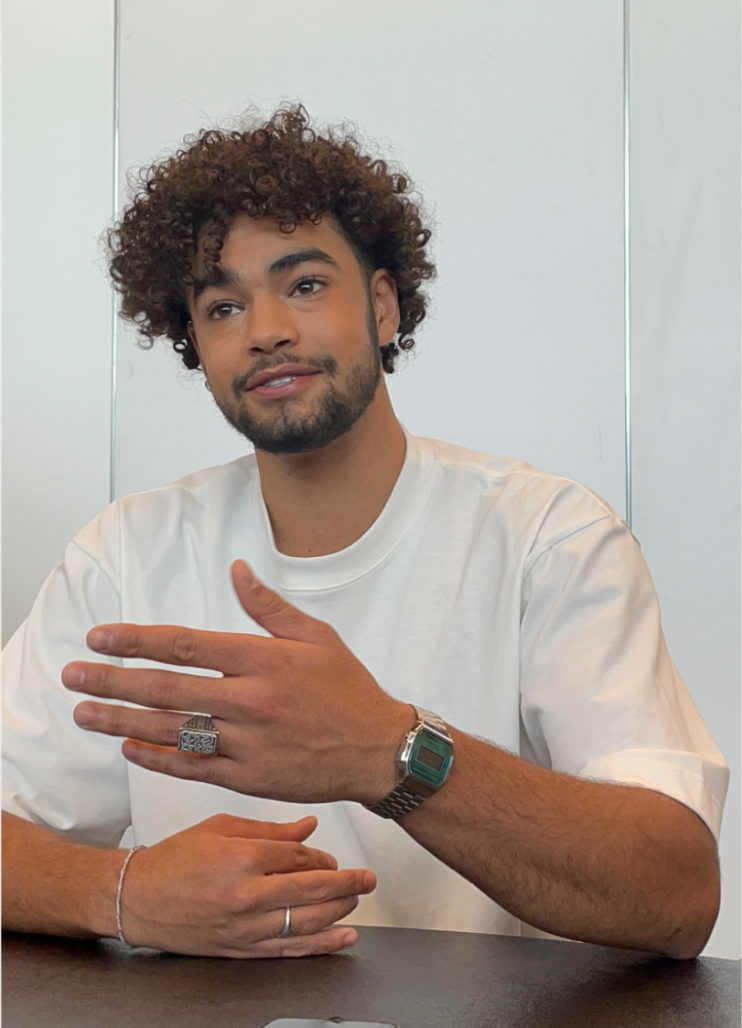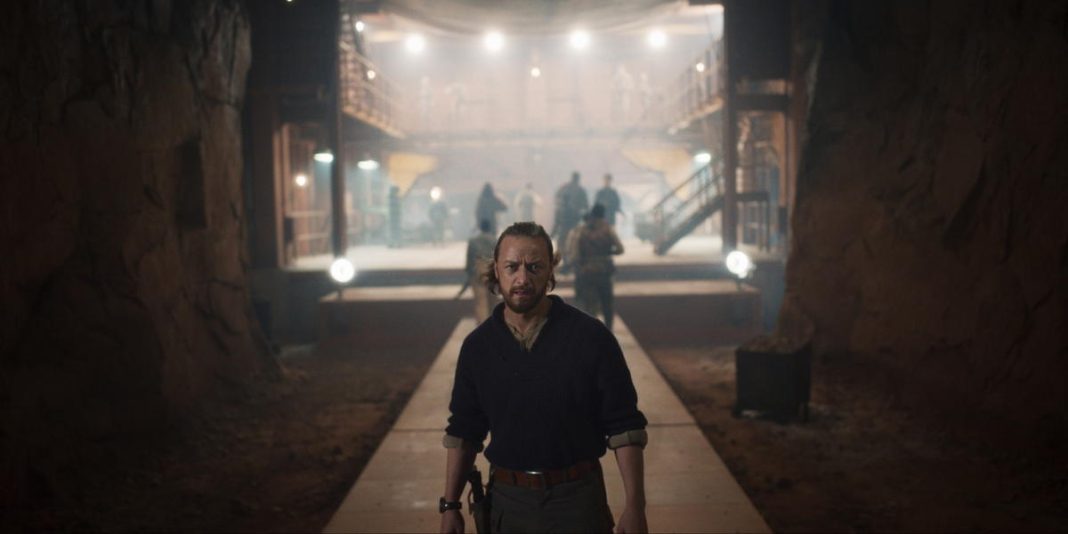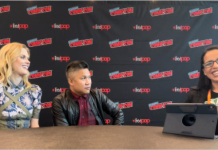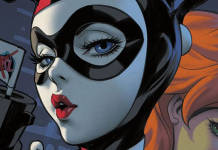By Gabriela Taveras
Three years is but a blip in history’s throes: nearly a full presidential term in some countries, and barely over half in others. In three years, we’ve had the pleasure of witnessing the beginning, middle and end of His Dark Materials, one of the most thought-provoking fantasy series ever produced. In its final season, which will premiere on December 5, the lauded show will conclude a gamut of conflicts stemming from a common desire to be free from oppression. During NYCC, The Beat sat down with Executive Producer Jane Tranter, Amir Wilson (Will Parry) and James McAvoy (Lord Asriel Belacqua) to discuss what to look forward to as they wrap up the trilogy, how to balance respecting the source material and taking creative liberties, and some of the reasons why they decided to bring Phillip Pullman’s story to life.
Gabriela Taveras: Pullman has been credited with saying that he wants to write adult novels that children should be able to read, and I feel like the show has been able to capture that, which is quite a delicate balance. How has the show successfully achieved this – a show that feels apt for families and at the same time something that adults can critically think about?
Jane Tranter: I think you put your finger on it. That is one of the most difficult things to achieve, and Pixar seems to do it on a regular basis. You can follow a story where there’s loads of jokes, but there is also dark stuff there that only perhaps adults will understand, and we really just follow Pullman’s lead on that. He is someone who will never, ever underestimate a child, and one of the big themes in His Dark Materials is how not to underestimate a child. Here’s Lyra and she’s going on this journey in which we follow her – and then, thematically, Pullman makes the story very complicated. We thought: “well, as long as we make Lyra and Will’s journey accessible in every way for a child, then the rest of it will come.” I like to think that His Dark Materials is one of those pieces that you can watch as a child and return to as a middle schooler, as a high schooler and as an adult, and you’ll get something different from it every time.

Amir Wilson: When I started filming the series I was about 16, and Will is about 12 or 13 in the books. It’s also been over a year since I shot season two compared to season three. Being able to play with that has been good because Will has kind of grown into a man whose experiences have changed him. You see him at the end of season two, and he’s lost his father, he’s lost Lyra. We’re going into season three, and I think he has a sense of what he wants and why he wants it. He knows he’s on a mission and he knows what he needs to do: he wants to fulfill his father’s dying wishes, but he also wants to find Lyra. He ends up getting sidetracked and going into the land of the dead, but being able to grow up with this clarity has been really fun for me.
Q: Will’s father and the angels have told him about the war, and he sort of knows what he needs to do. Does Will think he’s ready? That he will be capable of doing what needs to be done?
Wilson: I don’t think he feels he’s ready. Everything happens so quickly, you know? I think the whole of Season Two, on a timeline, is about two to three weeks from getting into Cittagazze until the end of the show, and everything happens really really, quickly. I’ve talked about Will growing up, and he’s obviously got a better use of the knife, and going into season three knows how to use it and uses it to the best of his ability.
Q: Now that you’re saying goodbye to the character and this universe, what was the thing you learned from Will that you will carry for the rest of your life?
Wilson: Always put yourself last. It’s a thing I’ve admired because he always puts everyone else in front of himself, even as a kid. Even before he got into the world of Cittagazze, growing up he looked after his mom, and I admire that and he’s such a genuinely good guy.
Q: Does Will think the knife is what makes him special or does he think that he could do a lot without it?
Wilson: Ultimately the knife does help, it’s part of him and it helps him in his journey, but I feel that, even without the knife, Will is a strong guy. I mean, the very fight where he got the knife and had his fingers cut off and stuff – that shows that he’s a strong enough person himself.
Q: What’s it like being on this show? You got your whole life ahead of you once it ends.
Wilson: It’s like a pinch me moment. Last week, I was playing games at my friend’s house and now I’m in New York City for Comic Con – it’s my first time in the city so I went to Times Square. I just looked at my mom and I thought, years ago, I wouldn’t believe this would ever happen. I’ve been really grateful and I’ve met and been surrounded by so many good people along the way, and I can only hope that things continue to go well for me.
James McAvoy (Lord Asriel)

Q: What did it feel like to be brought down from the bench? When it happened, how did you feel and what was your approach?
James McAvoy: My approach is called the books. I read the books and I told the story of how he [Lord Asriel] would be the guy he promised to be in the first season. He walks off at the end of season one to a different world, blasts a hole in the sky, tries to woo Mrs. Coulter by telling her “you and I are going to bring down the authority and we’re going to declare war on the heavens itself.” You got to come in with that big energy in season three, bring the thunder and actually bring the war. The biggest thing about Asriel is his belief that he is right, his belief in himself to be able to free the collective spirits of all conscious beings from tyranny and oppression represented by abusive institutions. All of that makes him feel like he’s right and will do whatever he needs to do, such as kill his daughter’s kid friend. He doesn’t care what he’s got to do as it’ll ultimately be better for everyone, and we know it’s not like that. We know that the journey has to be as full of integrity as your destination. The ends don’t always get justified by the means, but he has to learn that lesson over the course of season three by being challenged by Lyra, by her very existence.
The Beat: Thank you, James. It’s quite interesting that you mentioned the books, because in them we don’t see much of Asriel’s leadership as we do at the beginning of season three, or the process that he undertakes to form this army fighting in favor of the Republic of Heaven. Given the range of roles that you have played, how did you help craft this storyline since we didn’t see it in the books, and is this storyline related to the scrapped Asriel-focused episode from season two?
McAvoy: It’s not the scrapped Asriel storyline from season two – that focused on what happened literally the minute after he steps into another world at the end of season one. He ends up in Cittagazze before the Specters come in full force, so there’s still adults there, they’re living their lives. He’s there during the evacuation and he’s instrumental in this process. That was the story we were going with, maybe it’ll be a spinoff movie one day and I’ll be too old to play the part.
The stuff that we’ve added into season three was really about showing the formation of his forces and what he did to accumulate this vast coalition of not only people but species. They are all united by their suffering of oppression and abuse at the hands of the authority and its oppressive institutions. It was about showing that and articulating why we should be fighting, how we should be fighting, and showing the audience at the same time what the stakes are going to be by the time we get to the end of season. It was difficult, because there’s not a lot in the books of what Asriel and Coulter are doing. They are alluded to a lot of the time without being illustrated a lot of the time. We had carte blanche from Philip to go fill it in, but it was tricky because you start going off in different directions and suddenly it doesn’t feel like Asriel sometimes. He’s a one track guy, he’s like a locomotive just powering towards his final destination, and nothing’s going to stop him or get in his way. We ultimately kept coming back to this drive, this focus, this determination, this almost maniacal, one-way mentality that gets challenged by Coulter and Lyra.
Q: Do you have any head canons of what Asriel was up to since we don’t get to see it?
McAvoy: We built up to the war, that’s what I think would have been happening. He’s hanging on, he thinks he’s right and thinks he’s going to free the collective peoples of the multiverse, but it’s not happening. He’s stuck in the mire, he’s stuck in a war of attrition with the heavens, and he doesn’t quite understand why, and so he thinks he should try harder, he’s got to find something, he’s got to dig deeper, he’s got to sacrifice more – until he realizes that he’s not the guy, this isn’t about him: this is and has always has been about his little girl, and all he really has to do is be a dad, and help her beat the guy.
Q: James, what is your favorite thing in season three, and what would you say was the most challenging aspect of it?
McAvoy: Most challenging thing was figuring out what he [Asriel] does because it’s not written, and the books are so great, you don’t want to take anything away by adding too much, and at the same time, you want to show more than the books let on. You want to make sure that the writing is adding and not detracting – that was difficult. The thing I loved the most was just showing his journey from being this guy who will sacrifice anyone and anything to achieve what he knows is right, to becoming somebody who is willing to sacrifice himself.
Q: You’ve been a fan of the books since well before working on the show, and I’m curious, what excited you about this project? What drew you to Philip Pullman’s work?
McAvoy: I was introduced to these books when I was about 21. I was working with Justin Salinger and Indira Varma from Game of Thrones and Obi Wan Kenobi. I was trying to get her to read the Lord of the Rings and she went, “you need to read His Dark Materials.” I started reading and I was absolutely blown away, I’ve read the series three times since then, and that’s how I was brought into it. In terms of the TV show, my neighbor and longtime good friend Kelly Crawford, who is a casting director, was talking to me about the show, and then six months later, she was like: “how do you feel about playing Lord Asriel?” I said “absolutely. When do I start shooting?” “How is Monday?” The table read for episode one of season one is my single favorite table read that I’ve ever been involved in, because I was so excited to be a part of that world. I knew exactly what was going to be of the character, and I really enjoyed it.
Q: How hard is it to go in and out of those accents? You’re a proper Scotsman and you don’t always get to use that accent. Do you like that challenge?
McAvoy: It definitely is cool. It’s weirdly quite nice to work with other Scottish people. I’ve never ever thought to myself, “oh no, I feel like a fish out of water” or whatever, and then a couple of times I’ve worked on jobs with all Scottish people and I think “this is different, we share something.” Doing accents, it’s never really something that I think about too much, I just focus on whether I’m getting the accent right or not. It’s more about getting the voice of the person right, and if you get the voice right then usually the accent takes care of itself.









The thing I loved the most was just showing his journey from being this guy who will sacrifice anyone and anything to achieve what he knows is right, to becoming somebody who is willing to sacrifice himself.
Comments are closed.